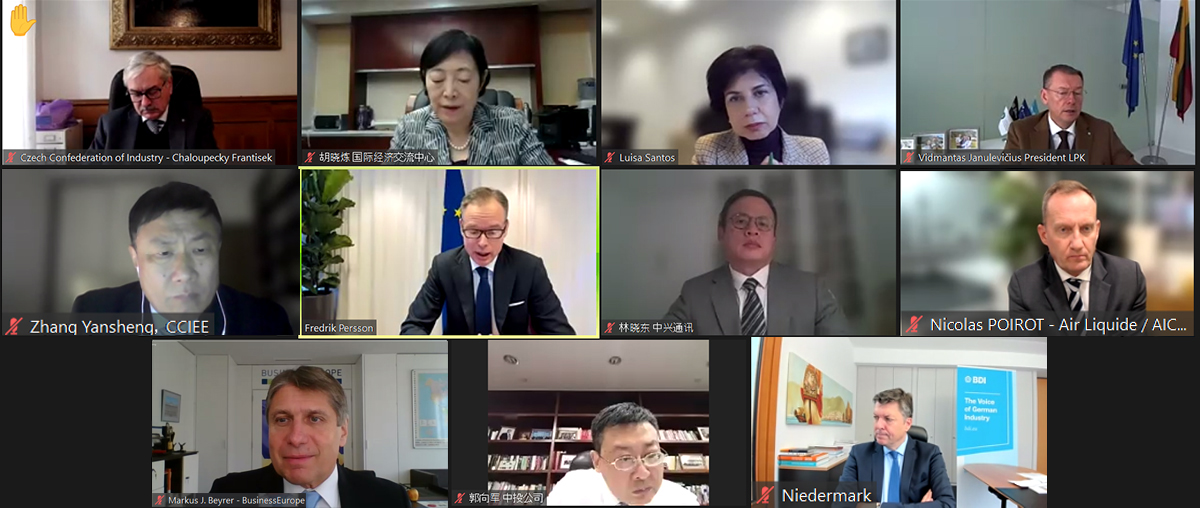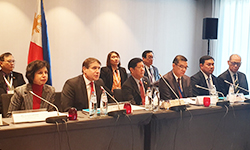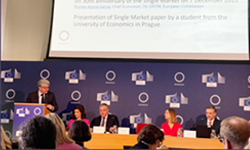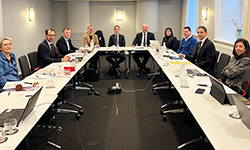BusinessEurope Headlines No. 2022-39
Dialogue between the EU and China continues to be important amid rising geopolitical tensions

“EU-China relations face one of the most challenging periods in recent history and the situation becomes ever more challenging for European companies. Nevertheless, China remains a necessary cooperation partner in certain areas where multilateral solutions are needed, and where we should continue to engage with China”, said Fredrik Persson, President of BusinessEurope, at the 5th EU-China CEO and Former Senior Officials Dialogue this morning. The event, which is co-organised once a year by BusinessEurope and the China Centre for International Economic Exchanges (CCIEE), brought together 30 business leaders, top academics and former senior officials from the EU and China. For half a day, participants exchanged views on EU-China economic relations and on ways to take them forward. The topics discussed included world economic recovery, supply chain disruptions and cooperation, the green and digital transitions, the reform of the multilateral trading system as well as the investment climate in the EU and China, and ways to modernise the bilateral economic relationship to create a level playing field. This year’s edition of the dialogue was hosted by CCIEE and took place virtually. “Against the current challenging geopolitical context including the war in Ukraine, disruptions in global supply chain, and the need to tackle the climate crisis, the discussions that the CEO and Former Senior Officials Dialogue fosters continue to be very important", President Persson added.
Contacts: Elena Suárez; Benedikt Wiedenhofer
Our comment
EU economy: what can we expect for 2023?
By James Watson, Chief Economist
 For businesses and policy-makers alike, the world is always one of challenges and opportunities, as innovation and technological development create new possibilities, as well as societal change, whilst putting existing business models under threat. But for much of 2022 it has seemed like there were only challenges. Putin’s invasion of Ukraine, as well as bringing the tragedy of war back to European soil, has thrown much of the global economy into a new economic crisis. Disruptions to global supply chains, already struggling to recover from the unprecedented shock of the pandemic, have combined with exponential increases in energy, raw material, and food prices, driving inflationary pressures, and particularly in net energy importers such as the EU, led to pressures on the cost of living.
For businesses and policy-makers alike, the world is always one of challenges and opportunities, as innovation and technological development create new possibilities, as well as societal change, whilst putting existing business models under threat. But for much of 2022 it has seemed like there were only challenges. Putin’s invasion of Ukraine, as well as bringing the tragedy of war back to European soil, has thrown much of the global economy into a new economic crisis. Disruptions to global supply chains, already struggling to recover from the unprecedented shock of the pandemic, have combined with exponential increases in energy, raw material, and food prices, driving inflationary pressures, and particularly in net energy importers such as the EU, led to pressures on the cost of living.
In contrast to the financial crisis, policy-makers have had fewer options. Public finances have already been stretched by the series of crises we have experienced in recent years, with average government debt levels in the EU of 88% at the start of 2022, compared to 65% in 2008. And whilst central banks were able to respond in 2009 by delivering enormous injections of support, the inflationary nature of the present crisis has required them to raise interest rates and withdraw liquidity, dampening economic activity and raising costs for households and businesses alike.
Whilst the long-term challenges of climate change and ageing populations have become more acute in recent years, the political consensus to find common solutions has become more fragmented. At national levels, we have seen the so-called collapse of the centre, with those who don’t see themselves as having benefitted from recent growth increasingly looking for solutions on the extreme left and right. At a global level, tensions, most apparent in the increasing U.S.-China divisions, require little elaboration.
But a closer look at some of the more positive data from the final months of 2023 should serve as a reminder that many of the immediate challenges, particularly around inflation, can be resolved by resolute and informed policy choices.
At a global level, many of the initial inflation drivers that emerged following the pandemic are now subsiding, with the global price indices for energy and raw materials such as metals both around 30% lower than their peaks earlier in the year. Moreover, the Freightos global container index of global shipping costs has decreased by over 75% since September 2021, with reliability improving substantially, albeit still below pre-COVID levels. Similarly, the New York Fed’s global supply chain pressure index has recovered substantially, to around 1 standard deviation above average, compared to over 4 at the start of the year. In the EU, we are now over 12 months since energy and raw material prices began to sky-rocket, leading to an automatic downward pressure on inflation as prices rises from last winter drop out of the index (so called base effects). Less positively, energy price rises earlier in the year have still not been fully passed on by businesses through supply chains (e.g. higher transport costs) to consumers, meaning it may be some months before we see, particularly core EU inflation (presently 5%), start to fall.
The EU labour market, despite hours worked below pre-COVID levels, is red hot, with unprecedented levels of skills shortages and vacancies. In this context, wage negotiators have generally acted responsibly this year, with settlements averaging 2.8% in the first three quarters according to ECB data. But with more recent signs that wage increases are starting to tick up – recruitment website Indeed’s euro area wage tracker suggests wage settlements were 5.1% in the 12 months to November - it remains crucial that social partners work together to finish the job of avoiding unsustainable wages increases feeding through into higher prices, setting off a wage-price spiral.
Member States have made some progress this year in bringing down government borrowing (expected to fall from 4.6% of GDP in 2021 to 3.4% in 2022), despite having to spend an additional 1.2% of GDP this year to mitigate the impact of high energy prices on consumers. Remarkably, overall government debt levels are expected to fall by 3 ½ percentage points of GDP on aggregate in most Member States in 2022, with the increase in the size of the economy in monetary terms exerting a downward factor of around 7 percentage points. But with the days of governments enjoying negative real funding costs limited, as inflation falls and interest rates rise, it will be essential in 2023 for Member States to agree on new rules for the Stability and Growth Pact. Although further details are required in some areas, the ideas outlined in the European Commission's November communication have the right focus on simplification, supporting public investment and structural reforms, as well as more effective enforcement.
The EU economy still faces a difficult winter. Many businesses, with balance sheets already weakened by 2 years of pandemic, and margins hit as they absorb increasing costs, will need further support to help them survive the winter. And with businesses likely to face higher energy costs for a significant period, there needs to be a greater focus on the attractiveness of the EU as an investment location, including minimising new regulatory burdens. But as businesses continue to innovate and global supply chains readjust post-COVID, and with the right policy mix to help address our many challenges, we can look forward to opportunities as well in 2023 and beyond.
Contact: James Watson
It’s time to give new impetus to EU-Philippines negotiations
 “Negotiations with the Philippines have not made the progress we hoped for, leaving us with a lot of untapped potential in our bilateral relationship. A free-trade agreement would go a long way in correcting the current asymmetry in our bilateral trade and investment relationship”, said Director General Markus J. Beyrer at the EU-Philippines Business Roundtable organised by BusinessEurope on 14 December in Brussels. European business has long been a strong advocate for an EU-ASEAN free-trade agreement; however, a region-to-region approach has proven too difficult. Bilateral agreements with individual ASEAN countries have proven to be more successful, as shown by the entry into force of deals with Singapore and Vietnam in 2019 and in 2020 respectively. “We hope agreements with individual countries can be building blocks to harmonise rules and promote further market integration. Therefore, this is the right time to revive talks to achieve an ambitious EU-Philippines free-trade agreement”, Beyrer concluded.
“Negotiations with the Philippines have not made the progress we hoped for, leaving us with a lot of untapped potential in our bilateral relationship. A free-trade agreement would go a long way in correcting the current asymmetry in our bilateral trade and investment relationship”, said Director General Markus J. Beyrer at the EU-Philippines Business Roundtable organised by BusinessEurope on 14 December in Brussels. European business has long been a strong advocate for an EU-ASEAN free-trade agreement; however, a region-to-region approach has proven too difficult. Bilateral agreements with individual ASEAN countries have proven to be more successful, as shown by the entry into force of deals with Singapore and Vietnam in 2019 and in 2020 respectively. “We hope agreements with individual countries can be building blocks to harmonise rules and promote further market integration. Therefore, this is the right time to revive talks to achieve an ambitious EU-Philippines free-trade agreement”, Beyrer concluded.
Contact: Catella Eleonora
The EU needs a more effective trade policy towards Africa
 “In the coming years, many European companies will seek to diversify their supply chains, production locations and markets. Due to its geographical proximity to Europe and its rich endowment with critical raw materials, this can create many opportunities for the African continent”, said Luisa Santos, Deputy Director General of BusinessEurope, at a breakfast discussion with representatives of business, the EU institutions and African governments on how the EU trade policy towards Africa can be made a more effective driver of deeper economic ties between our continents. At the event, hosted by BusinessEurope on 9 December, Santos moderated a panel between Dora Correia, Director at the European Commission Directorate General for Trade; Josephine Njambi Wambugu, Councillor at the Kenyan Embassy; MEP Helmut Scholz; and San Bilal, Senior Executive at the think tank ECDPM. This was followed by an exchange of views with the audience. “In order to reap the benefits that the complementarity of our economies promises to bring, the EU will need to modernise its trade agreements with the continent and use its development policy and other relevant instruments in a more complementary way. The European business community stands ready to play its role in this endeavour,” Santos concluded. In a recent position paper on the topic, BusinessEurope sets out some concrete recommendations for deepening EU-Africa trade and investment relations.
“In the coming years, many European companies will seek to diversify their supply chains, production locations and markets. Due to its geographical proximity to Europe and its rich endowment with critical raw materials, this can create many opportunities for the African continent”, said Luisa Santos, Deputy Director General of BusinessEurope, at a breakfast discussion with representatives of business, the EU institutions and African governments on how the EU trade policy towards Africa can be made a more effective driver of deeper economic ties between our continents. At the event, hosted by BusinessEurope on 9 December, Santos moderated a panel between Dora Correia, Director at the European Commission Directorate General for Trade; Josephine Njambi Wambugu, Councillor at the Kenyan Embassy; MEP Helmut Scholz; and San Bilal, Senior Executive at the think tank ECDPM. This was followed by an exchange of views with the audience. “In order to reap the benefits that the complementarity of our economies promises to bring, the EU will need to modernise its trade agreements with the continent and use its development policy and other relevant instruments in a more complementary way. The European business community stands ready to play its role in this endeavour,” Santos concluded. In a recent position paper on the topic, BusinessEurope sets out some concrete recommendations for deepening EU-Africa trade and investment relations.
![]() Contact: Benedikt Wiedenhofer
Contact: Benedikt Wiedenhofer
Social dialogue communication: an opportunity to promote and strengthen social partners’ role
 The upcoming social dialogue communication should provide a framework for strengthening social dialogue across Europe, taking into account national specificities and the importance of social partners’ autonomy. In order to fully play their role, social partners in some countries need additional capacity building support and the European Social Fund+ (ESF+) has a key role to play in this respect. The European Commission’s communication is also an important opportunity to strengthen tripartism at EU level, creating a new much needed space for the Commission, national governments, and EU and national social partners to address topical labour market issues in a timely way. These were among the key messages given by Maxime Cerutti, BusinessEurope Director for Social Affairs, in a meeting with the European Commissioner for Jobs and Social Rights Nicolas Schmit on 9 December. The social dialogue initiative is set to be published towards the end of January and will comprise a Commission communication and a Council recommendation.
The upcoming social dialogue communication should provide a framework for strengthening social dialogue across Europe, taking into account national specificities and the importance of social partners’ autonomy. In order to fully play their role, social partners in some countries need additional capacity building support and the European Social Fund+ (ESF+) has a key role to play in this respect. The European Commission’s communication is also an important opportunity to strengthen tripartism at EU level, creating a new much needed space for the Commission, national governments, and EU and national social partners to address topical labour market issues in a timely way. These were among the key messages given by Maxime Cerutti, BusinessEurope Director for Social Affairs, in a meeting with the European Commissioner for Jobs and Social Rights Nicolas Schmit on 9 December. The social dialogue initiative is set to be published towards the end of January and will comprise a Commission communication and a Council recommendation.
Contact: Robert Plummer
30 years of Single Market: promise of “doing business like on a home market” still to be fullfilled
 On 7-8 December, the Czech EU Council Presidency organised a conference to mark the 30th anniversary of the EU Single Market in Prague. BusinessEurope was invited to share its views on the future needs for further integration of the Single Market. With keynote addresses from European Commissioner for Internal Market Thierry Breton and the European Parliament’s IMCO (Internal Market and Consumer Protection) Committee Chair Anna Cavazzini, the conference had a few panels with public officials and stakeholders, discussing the role of the Single Market in the green and digital transition as well as the challenges impeding SME growth across borders. “Speaking of the future Single Market as an area of the four freedoms granted by the Treaties, we should not drift away towards a discussion on issues such as crisis management or strategic dependencies from the angle of industrial policy”, insisted Martynas Barysas, Director for Internal Market at BusinessEurope. “They are important topics, but we need a clear Single Market policy objective of unconditional freedom to trade, so that we can finally fulfil the ‘do business like on a home market’ promise throughout the EU”, he added. Many speakers agreed that a fully functioning Single Market would largely contribute to the EU economy’s resilience. “Digitalisation, opening of services markets as great contributors to greening the economy, free movement of workers and investment to their skills, rules which do not overburden businesses or create market fragmentation – these are main elements to work on in the future”, Barysas concluded.
On 7-8 December, the Czech EU Council Presidency organised a conference to mark the 30th anniversary of the EU Single Market in Prague. BusinessEurope was invited to share its views on the future needs for further integration of the Single Market. With keynote addresses from European Commissioner for Internal Market Thierry Breton and the European Parliament’s IMCO (Internal Market and Consumer Protection) Committee Chair Anna Cavazzini, the conference had a few panels with public officials and stakeholders, discussing the role of the Single Market in the green and digital transition as well as the challenges impeding SME growth across borders. “Speaking of the future Single Market as an area of the four freedoms granted by the Treaties, we should not drift away towards a discussion on issues such as crisis management or strategic dependencies from the angle of industrial policy”, insisted Martynas Barysas, Director for Internal Market at BusinessEurope. “They are important topics, but we need a clear Single Market policy objective of unconditional freedom to trade, so that we can finally fulfil the ‘do business like on a home market’ promise throughout the EU”, he added. Many speakers agreed that a fully functioning Single Market would largely contribute to the EU economy’s resilience. “Digitalisation, opening of services markets as great contributors to greening the economy, free movement of workers and investment to their skills, rules which do not overburden businesses or create market fragmentation – these are main elements to work on in the future”, Barysas concluded.
![]() Contact: Martynas Barysas
Contact: Martynas Barysas
Debate on new economic governance framework with European Commission
 In the face of a pandemic that has caused unprecedented economic damage and a rapidly changing global landscape where competition in many business sectors is intensifying, it has never been more essential that fiscal rules are well designed to support long-term growth and competitiveness in Europe. This was the key message of members of BusinessEurope’s Economic and Financial Affairs Committee during a video call with Gilles Mourre, Head of Unit, Fiscal Policy and Surveillance at the European Commission Directorate General for Economic and Financial Affairs, on 7 December. Following Mourre’s presentation of the ideas that the European Commission unveiled in their November communication, members had the opportunity to ask questions and also underscore the need for rapid agreement on a new framework that emphasises incentives for structural reforms and investments as well as ensuring credible enforcement of rules.
In the face of a pandemic that has caused unprecedented economic damage and a rapidly changing global landscape where competition in many business sectors is intensifying, it has never been more essential that fiscal rules are well designed to support long-term growth and competitiveness in Europe. This was the key message of members of BusinessEurope’s Economic and Financial Affairs Committee during a video call with Gilles Mourre, Head of Unit, Fiscal Policy and Surveillance at the European Commission Directorate General for Economic and Financial Affairs, on 7 December. Following Mourre’s presentation of the ideas that the European Commission unveiled in their November communication, members had the opportunity to ask questions and also underscore the need for rapid agreement on a new framework that emphasises incentives for structural reforms and investments as well as ensuring credible enforcement of rules.
![]() Contact: Cornelius Hermelink
Contact: Cornelius Hermelink
EU tax reform: exchange of views with upcoming Swedish EU Presidency
 The EU must position itself as a competitive place for businesses to invest in through its upcoming tax reforms. Specifically, the proposed BEFIT (Business in Europe: Framework for Income Taxation) should reflect and build on the progress made in the global tax discussions (specifically the G20/OECD’s Two-Pillar Framework) and provide simple, predictable and a stable tax regime that incentivises long-term investment. This was the key message of members of BusinessEurope’s Tax Policy Group during an exchange of views with representatives from the Ministry of Finance in Sweden at its meeting, hosted by our Swedish member federation Svenskt Näringsliv in Stockholm on 14 December. Following a discussion on the priorities for the Swedish presidency of the Council of the EU in the area of tax, the group stressed that any new and existing initiatives in this field should undergo a competitiveness check in order to simplify rules that are too difficult to administer and to help businesses be more innovative, productive and committed to the societies where we live in.The Green Tax Working Group and the VAT Policy Working Group also exchanged views with representatives from the Swedish Ministry of Finance on the proposed revisions of the Energy Tax Directive and the VAT in the Digital Age Package proposed last week by the European Commission.
The EU must position itself as a competitive place for businesses to invest in through its upcoming tax reforms. Specifically, the proposed BEFIT (Business in Europe: Framework for Income Taxation) should reflect and build on the progress made in the global tax discussions (specifically the G20/OECD’s Two-Pillar Framework) and provide simple, predictable and a stable tax regime that incentivises long-term investment. This was the key message of members of BusinessEurope’s Tax Policy Group during an exchange of views with representatives from the Ministry of Finance in Sweden at its meeting, hosted by our Swedish member federation Svenskt Näringsliv in Stockholm on 14 December. Following a discussion on the priorities for the Swedish presidency of the Council of the EU in the area of tax, the group stressed that any new and existing initiatives in this field should undergo a competitiveness check in order to simplify rules that are too difficult to administer and to help businesses be more innovative, productive and committed to the societies where we live in.The Green Tax Working Group and the VAT Policy Working Group also exchanged views with representatives from the Swedish Ministry of Finance on the proposed revisions of the Energy Tax Directive and the VAT in the Digital Age Package proposed last week by the European Commission.
![]() Contact: Mariella Caruana
Contact: Mariella Caruana
Calendar 
- 12 January: European business in China post-2022 – The view from the ground
- Mid-January: Headlines is back!
- 16-20 January: World Economic Forum 2023
Not yet a subscriber? Register here.
Reminder: please have a look at our privacy policy